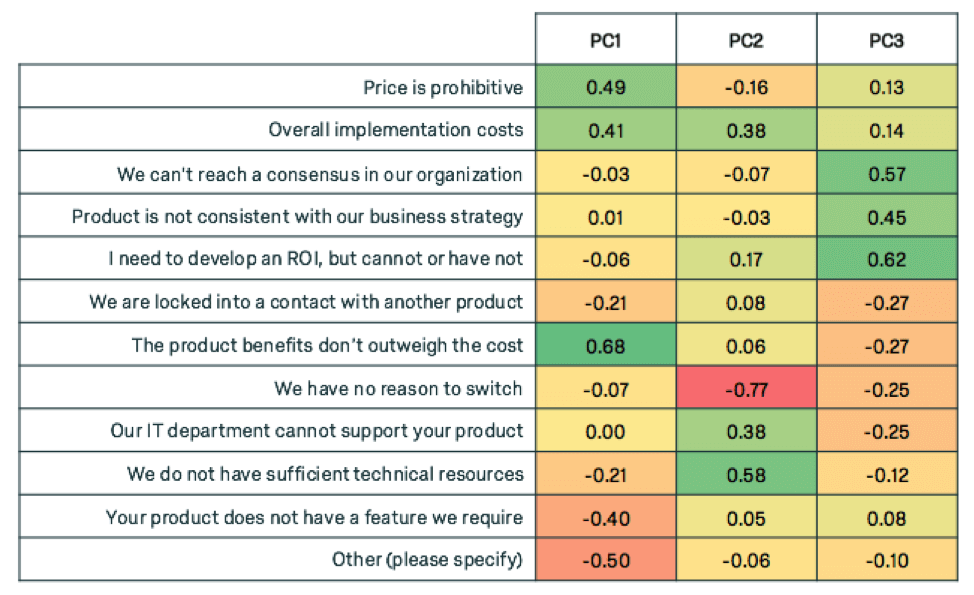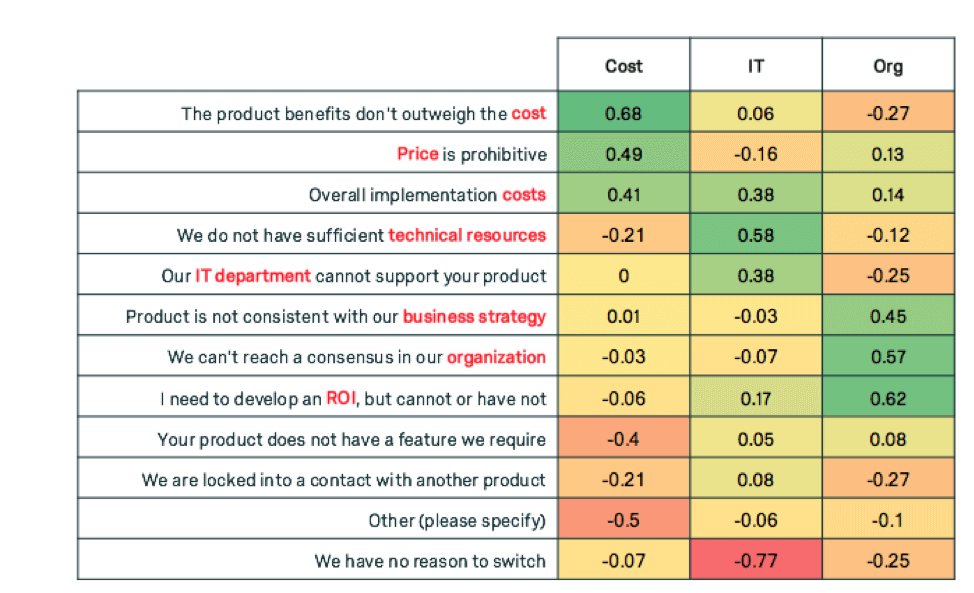For Which Reason Would a Researcher Use Factor Analysis Psychology
Analyses of 3 existing empirical data sets are used to illustrate how questionable decisions in conducting factor analyses can yield problematic results. The original raw data.

Factor Analysis Simplifying Your Research Qualtrics Au
The Reasons for Smoking Scale RSS a self-assessment tool for identifying smokers motives has been in use for over 30 years.

. Factor analysis is used in many fields such as behavioural and social sciences medicine economics and geography as a result of the technological advancements of computers. The theory is that there are deeper factors driving the underlying concepts in your data and that you can uncover and work with these instead of dealing with the lower-level variables that cascade from them. Exploratory factor analysis and confirmatory factor analysis.
The two main factor analysis techniques are Exploratory Factor. What is factor analysis used for in research. Factor analysis is a type of statistical procedure that is conducted to identify clusters or groups of related items called factors on a test.
It can be used to classify nation profiles into types with similar characteristics or behavior. What is Factor Analysis. Factor analysis is a way to condense the data in many variables into a just a few variables.
Factor analysis can be used to identify the hidden dimensions or constructs which may or may not be apparent from direct analysis. Handbook of Research Methods in Personality Psychology. For this reason it is also sometimes called dimension reduction You can reduce the dimensions of your data into one or more super-variables The most common technique is known as Principal Component Analysis.
You may like to use previously selected factor names but on examining the actual items and factors you may think a different name is more appropriate. Exploratory factor analysis EFA is used when theory development process such as initial development of a new research instrument and when researcher use. Factor analysis is a tool for developing an empirical typology.
Factor analysis is a statistical procedure used to identify a small number of factors that can be used to represent relationships among sets of interrelated variables. Used to reduce the number of variables for a simpler analysis used to help identify underlying causes of variability of items used to identify variables that cannot be directly observed personality 2 types. One factor naming technique is to use the top one or two loading items for each factor.
An Overview of Factor Analysis Factor analysis attempts to reduce many corre-lated variables to a few broader dimensions ie factors that summarize the correlations between those variables1 The process of factor 424 These are two chapter excerpts from Guilford Publications. Extraversion and openness The Big Five are believed to be orthogonal factors of personality. Factor analysis is the practice of condensing many variables into just a few so that your research data is easier to work with.
What does orthogonal mean. Factor scores are composite measures for each factor representing each subject. Despite the widespread use of exploratory factor analysis in psychological research researchers often make questionable decisions when conducting these analyses.
These unobservable constructs that explain the pattern of correlations among measures are referred to as common factors. As a research technic in psychology and education factor analysis is an extension of the correlation method in that it seeks to find what goes with what but at the same time it usually seeks to reduce the number of variables needed to describe phenomena. PCA components may enhance parsimony in other statistical analyses and may contribute information for decisions regarding the number of factors to retain for subsequent common factor analysis but most methodologists recommend that common factor analysis be employed when the purpose is to identify latent constructs responsible for the variation of.
Which of the following Big Five factors are subfactors of this factor. 50 It is a means of determining to what degree individual items are measuring a something in common such as a factor. For example COMPUTER USE BY TEACHERS is a broad construct that can have a number of FACTORS use for testing use for research use for presentation development etc.
7 It can be used to group interdependent variables into descriptive categories such as ideology revolution liberal voting and authoritarianism. Factor analyses have revealed a broader personality factor called plasticity. This article reviews the major design and analytical decisions that must be made when conducting a factor analysis and notes that each of these decisions has important consequences.
5051 Factors are underlying. The article presents a survey of 2 prominent journals that suggests that researchers routinely conduct analyses using such questionable methods. Analyses of 3 existing empirical data sets are used to illustrate how questionable decisions in conducting factor analyses can yield problematic results.
In the present study. Factor analysis is a procedure used to determine the extent to which shared variance the intercorrelation between measures exists between variables or items within the item pool for a developing measure. The article presents a survey of 2.
Previous factor validity studies which relied exclusively on exploratory factoring procedures have consistently extracted six scales from the RSS. The advantages of factor analysis are as follows. Both objective and subjective attributes can be used.
For example when you take a multiple choice Introductory Psychology test a factor analysis can be done to see what types of questions you did best on and worst on maybe they did best on factual types of questions but really poorly on conceptual. Factor analysis is a term used to refer to a set of statistical procedures designed to determine the number of distinct unobservable constructs needed to account for the pattern of correlations among a set of measures. When the analyst is interested in creating an entirely new set of a smaller number of composite variables to replace either in part or completely the original set of variables then the analyst would compute factor scores for use as such composite variables.
Meaningful names for the extracted factors should be provided. Identification of groups of inter-related variables to see how they are related to each other.

Pdf Factor Analysis In The Development And Refinement Of Clinical Assessment Instruments

Pdf Evaluating The Use Of Exploratory Factor Analysis In Psychological Research

No comments for "For Which Reason Would a Researcher Use Factor Analysis Psychology"
Post a Comment